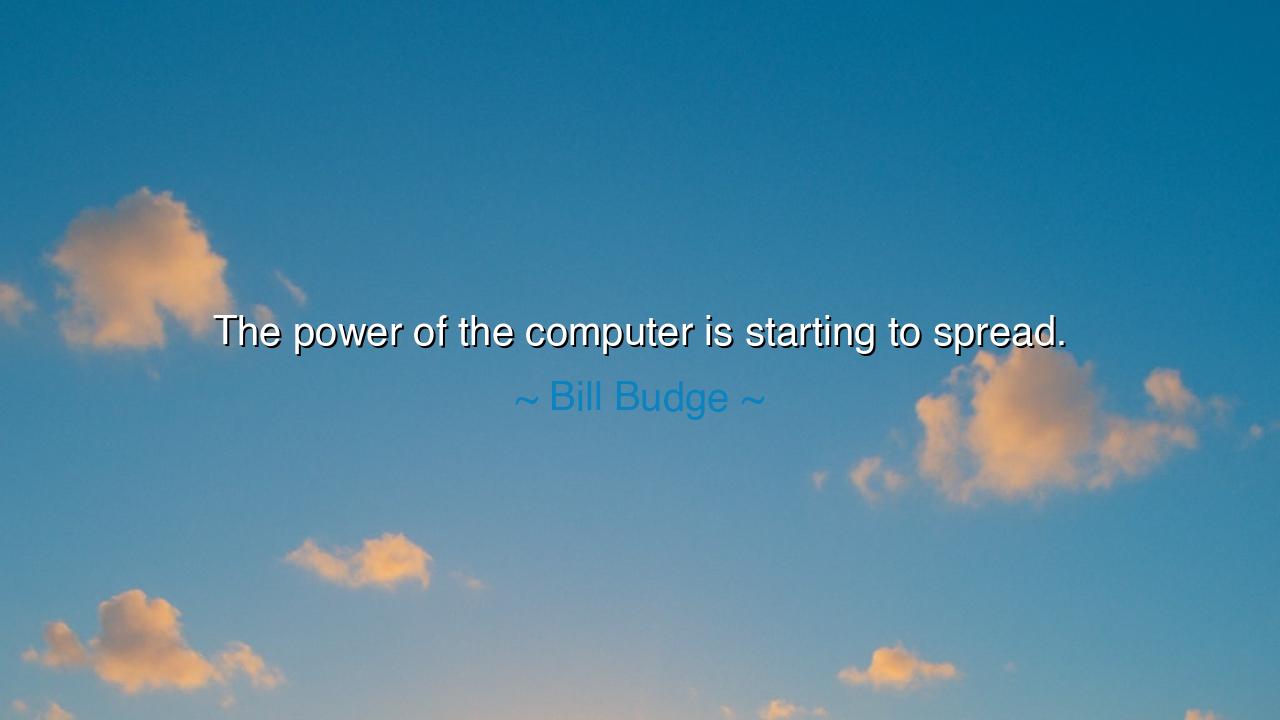
The power of the computer is starting to spread.






In the annals of human progress, there are moments when a shift in power takes place—a force so profound that it begins to ripple through every facet of existence, touching all who dwell within it. Bill Budge’s words, “The power of the computer is starting to spread,” echo the dawn of such a transformation. These words, spoken long ago, speak not just of technology, but of a revolution. For the computer, once a distant, enigmatic machine, has now become an agent of change, spreading its influence far beyond the realms of mere calculations or mechanical tasks. This quote marks the early recognition of an impending era—a time when digital power would not just belong to the few but to the many, altering the very fabric of human life.
At the time these words were spoken, computers were still viewed as mysterious and distant tools. The machines were in the hands of a select few—engineers, scientists, and military minds. Yet, Budge’s vision foresaw the power of the computer extending into the homes of ordinary people, igniting a democratic revolution of sorts. Much like the invention of the printing press, which spread knowledge and ideas to the masses, the advent of the computer would soon allow information and creativity to flow freely, touching lives in ways never before imagined.
The history of human civilization is, in many ways, the story of knowledge spreading to those who once had little access to it. The ancient Greeks spoke of the power of knowledge as the ultimate force, capable of shaping destinies and changing the course of events. The Renaissance saw an explosion of ideas that reshaped the very way humans saw themselves and their world. In this same tradition, the computer, which once required specialized knowledge and skill to operate, is now everywhere, in our pockets, on our desks, and in our homes. The power that Budge spoke of has indeed spread, and with it, the potential for humanity to shape its future with tools that once seemed like science fiction.
Consider the tale of Ada Lovelace, the mathematician and visionary who, in the 19th century, first saw the computer’s potential beyond mere calculations. She understood, long before it was ever realized, that machines could do more than simply follow instructions—they could think, in their own way. Lovelace’s vision, though ahead of her time, was not too dissimilar to Budge’s proclamation. She foresaw a world where the power of computation was not confined to the realm of the elite but would one day spread, touching all and changing everything. Budge, too, saw the emerging digital world as a place where the power of knowledge and creation would no longer belong only to the few but to the many.
This spreading power, however, comes with a great responsibility. Power, as it has always been, is both a gift and a challenge. As humanity’s relationship with the computer deepens, so too does the moral weight of how we choose to wield it. The computer, now at the heart of nearly every industry and every aspect of life, brings with it the power to create and the power to destroy. Technology is a tool that reflects the character of its user. The spread of computing power, as Budge envisioned, must be guided by wisdom, for without wisdom, power is like an unbridled force—able to build, yes, but also to break.
The story of human progress teaches us that the greatest transformations occur when knowledge is shared and when the power to create is made available to all. Budge’s statement, prophetic in its simplicity, is a reminder of what is possible when the power of the few becomes the power of the many. Yet, as we wield this great power, we must ask ourselves: Are we using it to build a future of growth, creativity, and progress, or are we allowing it to become a tool of division, control, and destruction? The spread of computing power is not just a technological shift—it is a moral shift as well.
Lesson for the ages:
The power of the computer is not just in its technology; it lies in the ways we choose to use it. As it spreads into every corner of our lives, we must remember that knowledge and power must be tempered with wisdom. Just as the wheel, when mastered, can help build civilizations, so too can the computer when we use it to enlighten, connect, and create. The spread of power is not an inevitability—it is a choice.
Practical Action:
As the power of the computer spreads further into your life, use it wisely. Seek not just to be a passive recipient of its gifts but an active participant in the creation of a better world. Whether you are a teacher, a student, a creator, or a leader, remember that with every click, every code written, and every program launched, you have the power to shape a future that reflects the best of humanity. Use the power of the computer not just to further your own goals, but to elevate the world around you.






AAdministratorAdministrator
Welcome, honored guests. Please leave a comment, we will respond soon